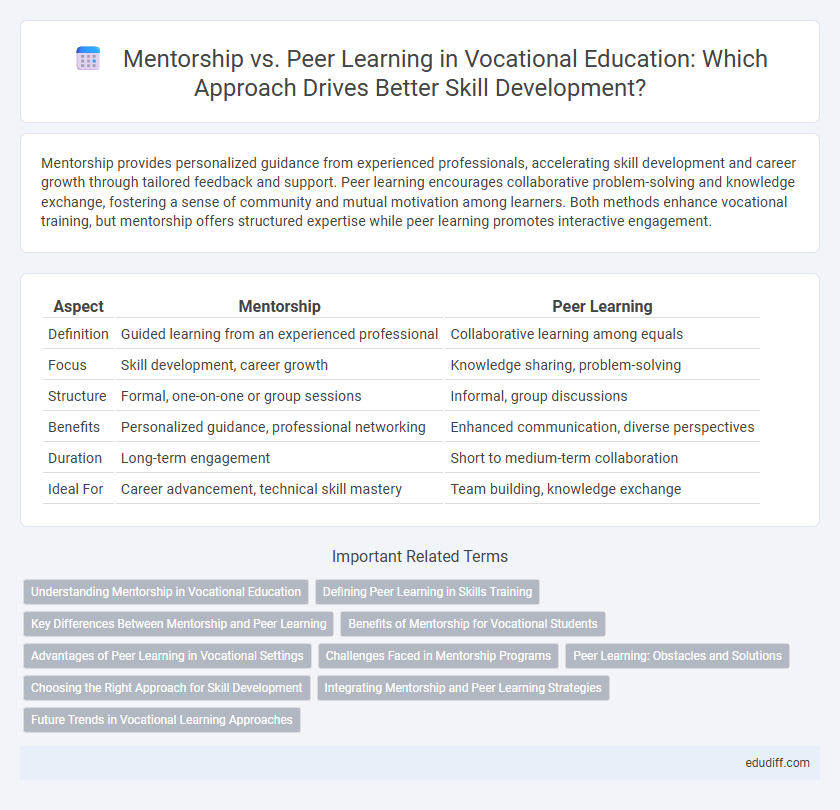Mentorship provides personalized guidance from experienced professionals, accelerating skill development and career growth through tailored feedback and support. Peer learning encourages collaborative problem-solving and knowledge exchange, fostering a sense of community and mutual motivation among learners. Both methods enhance vocational training, but mentorship offers structured expertise while peer learning promotes interactive engagement.
Table of Comparison
| Aspect | Mentorship | Peer Learning |
|---|---|---|
| Definition | Guided learning from an experienced professional | Collaborative learning among equals |
| Focus | Skill development, career growth | Knowledge sharing, problem-solving |
| Structure | Formal, one-on-one or group sessions | Informal, group discussions |
| Benefits | Personalized guidance, professional networking | Enhanced communication, diverse perspectives |
| Duration | Long-term engagement | Short to medium-term collaboration |
| Ideal For | Career advancement, technical skill mastery | Team building, knowledge exchange |
Understanding Mentorship in Vocational Education
Mentorship in vocational education involves experienced professionals guiding learners through personalized instruction and practical skill development, fostering deeper industry insights and professional growth. This approach emphasizes one-on-one relationships that tailor learning to individual needs, accelerating competency and confidence in real-world tasks. Effective mentorship bridges theoretical knowledge and practical application, crucial for mastering trade-specific techniques and career readiness.
Defining Peer Learning in Skills Training
Peer learning in skills training involves learners actively collaborating and sharing knowledge to enhance practical competencies. This approach fosters mutual problem-solving, enabling participants to develop vocational skills through real-time feedback and hands-on experiences. Peer learning emphasizes collective growth, making it a dynamic alternative to traditional mentorship by promoting equal participation and continuous skill reinforcement.
Key Differences Between Mentorship and Peer Learning
Mentorship involves a structured relationship where an experienced professional guides a less experienced individual, offering personalized advice and industry insights to accelerate skill development. Peer learning is a collaborative process among individuals at similar skill levels, emphasizing mutual knowledge sharing and problem-solving through group interaction. Key differences include the hierarchical nature, with mentorship providing expert guidance, while peer learning fosters equal participation and shared responsibility in vocational growth.
Benefits of Mentorship for Vocational Students
Mentorship for vocational students accelerates skill development by providing personalized guidance tailored to industry standards and practical challenges. Experienced mentors offer valuable insights into career pathways, enhancing students' employability and professional networks. This direct support fosters confidence, problem-solving abilities, and a deeper understanding of workplace dynamics, which peer learning alone may not fully provide.
Advantages of Peer Learning in Vocational Settings
Peer learning in vocational settings fosters collaborative skill development through hands-on experiences and real-time feedback, enhancing practical knowledge retention. It encourages critical thinking and problem-solving by enabling peers to share diverse perspectives and industry-specific insights. This approach also builds communication and teamwork skills essential for workplace success, creating a dynamic and supportive learning environment.
Challenges Faced in Mentorship Programs
Mentorship programs often face challenges such as mismatched expectations between mentors and mentees, limited availability of experienced mentors, and difficulty in maintaining consistent engagement throughout the learning process. Communication barriers and lack of tailored feedback can hinder the effectiveness of mentorship, reducing the transfer of practical skills in vocational settings. Addressing these issues requires structured mentorship frameworks and ongoing support to foster productive mentor-mentee relationships.
Peer Learning: Obstacles and Solutions
Peer learning in vocational training faces obstacles such as varying skill levels, communication barriers, and lack of structured guidance, which can hinder effective knowledge exchange. Implementing clear frameworks, providing facilitator support, and utilizing collaborative technologies help overcome these challenges. Tailored peer learning strategies enhance skill development and foster a supportive learning environment.
Choosing the Right Approach for Skill Development
Mentorship offers personalized guidance from experienced professionals, accelerating skill acquisition through tailored feedback and industry insights. Peer learning fosters collaboration, enabling individuals to share diverse perspectives and solve problems collectively, enhancing critical thinking and adaptability. Selecting the right approach depends on specific vocational goals, learning preferences, and the need for either expert direction or interactive knowledge exchange.
Integrating Mentorship and Peer Learning Strategies
Integrating mentorship and peer learning strategies in vocational training enhances skill acquisition and professional development by combining personalized guidance with collaborative problem-solving. Mentorship provides tailored feedback and industry insights, while peer learning fosters mutual support and knowledge exchange among learners. This hybrid approach accelerates competency building and promotes a dynamic learning environment aligned with vocational standards.
Future Trends in Vocational Learning Approaches
Future trends in vocational learning emphasize the integration of mentorship and peer learning to enhance skill acquisition and adaptability in changing job markets. Personalized mentorship leverages expert guidance to accelerate competency development, while peer learning platforms foster collaborative problem-solving and continuous feedback, promoting lifelong learning habits. Emerging technologies like AI-driven analytics and virtual reality simulations are expected to further optimize both mentorship and peer learning by providing tailored, immersive experiences that align with individual learning paths.
Mentorship vs Peer learning Infographic

 edudiff.com
edudiff.com